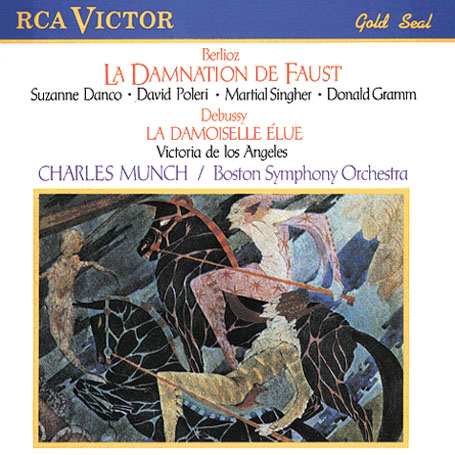Berlioz Dammnation du Faust; Debussy Damoiselle élue
View record and artist detailsRecord and Artist Details
Label: Galleria
Magazine Review Date: 2/1989
Media Format: CD or Download
Media Runtime: 122
Mastering:
ADD
Catalogue Number: 423 907-2GGA2

Composer or Director: Claude Debussy
Label: Gold Seal
Magazine Review Date: 2/1989
Media Format: Cassette
Media Runtime: 0
Mastering:
ADD
Catalogue Number: GK87940

Tracks:
| Composition | Artist Credit |
|---|---|
| (La) Damoiselle élue |
Claude Debussy, Composer
Boston Symphony Orchestra Carol Smith, Mezzo soprano Charles Munch, Conductor Claude Debussy, Composer Radcliffe Choral Society Victoria de los Ángeles, Soprano |
Composer or Director: Claude Debussy
Label: Gold Seal
Magazine Review Date: 2/1989
Media Format: CD or Download
Media Runtime: 141
Mastering:
ADD
Catalogue Number: GD87940

Tracks:
| Composition | Artist Credit |
|---|---|
| (La) Damoiselle élue |
Claude Debussy, Composer
Boston Symphony Orchestra Carol Smith, Mezzo soprano Charles Munch, Conductor Claude Debussy, Composer Radcliffe Choral Society Victoria de los Ángeles, Soprano |
Author: Lionel Salter
Munch also resorts to this questionable practice in the Hungarian March, and it is particularly illogical of him to speed up the end of the double chorus of soldiers and students, only to slacken pace for their march out. But on the whole his performance shows a greater grasp of Berliozian nuance than Ozawa, and the playing of the Boston Symphony Orchestra is more pointed: there is a fine viola solo, but the brass tend to be over-enthusiastic. (Did they have to blare out the Retreat so fiercely at the start of Part 3?) The chorus is efficient but reluctant to sing softly, and seems to be responsible for a few shuffles, rustles and noises. David Poleri, though not entirely at home with French vowel sounds, impresses with his thrillingly ringing tone, perhaps making Faust more heroic than he deserves: he also brings a winning lyricism to ''Merci, doux crepuscule'' and ''Ange adoree'' but ignores the ppp marking in the latter, and was allowed, most inappropriately, to sing ''Que j'aime ce silence''
This RCA issue adds a generous extra in the shape of the Debussy cantata (or, as he himself described it, ''poeme lyrique''). The plus points in this performance are the tender orchestral prelude and the ecstatic singing of Victoria de los Angeles at her vision of the angels' rejoicing and at the climactic ''Ensemble, moi et lui'': the minus point is the almost comically schoolgirlish singing of the female chorus, who give equal weight to every syllable (their enunciation certainly very clear) without suggesting the smallest comprehension of what it all means. The digitally remastered recording does show its age a little, but is reasonably acceptable.'
Discover the world's largest classical music catalogue with Presto Music.

Gramophone Digital Club
- Digital Edition
- Digital Archive
- Reviews Database
- Full website access
From £8.75 / month
Subscribe
Gramophone Full Club
- Print Edition
- Digital Edition
- Digital Archive
- Reviews Database
- Full website access
From £11.00 / month
Subscribe
If you are a library, university or other organisation that would be interested in an institutional subscription to Gramophone please click here for further information.





